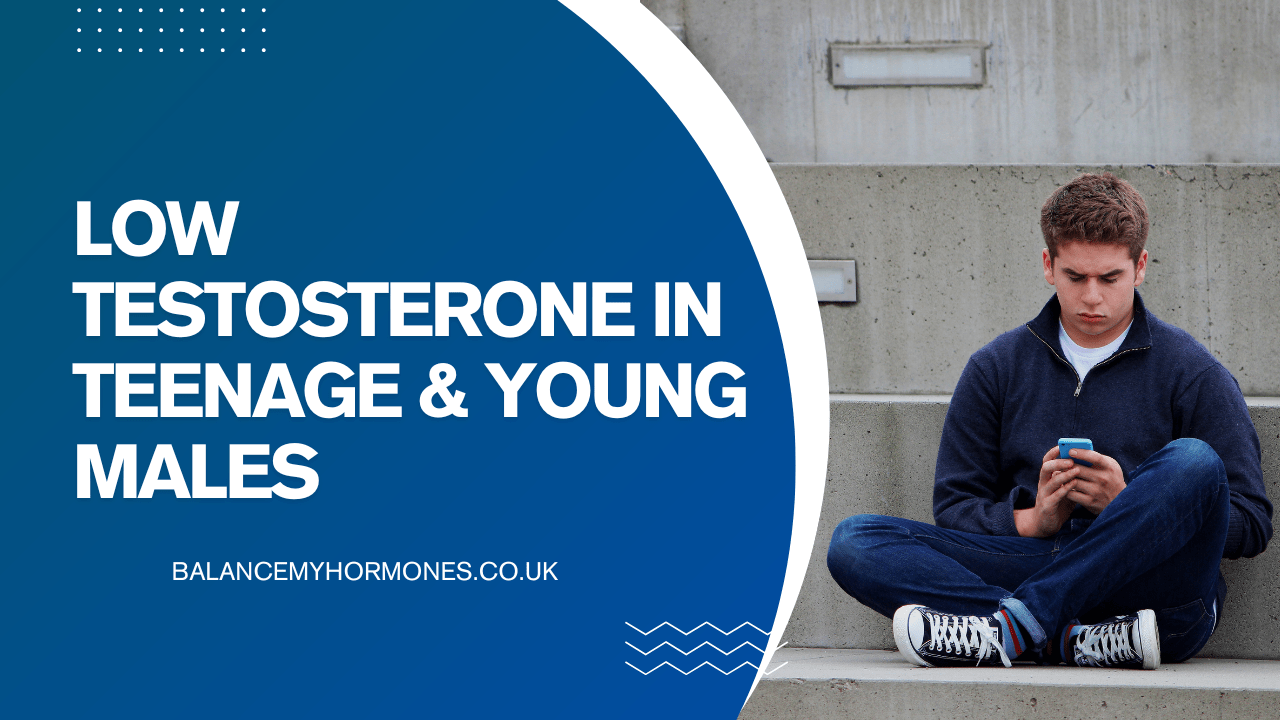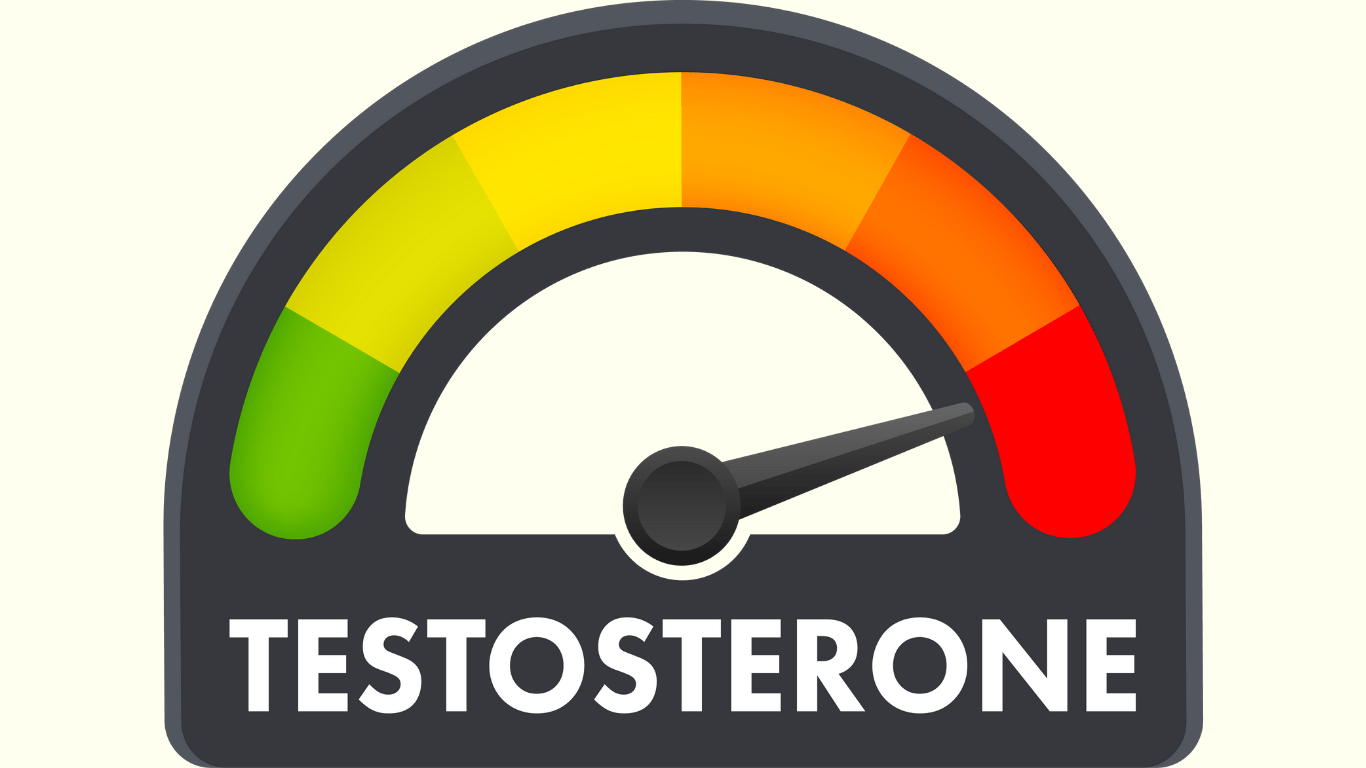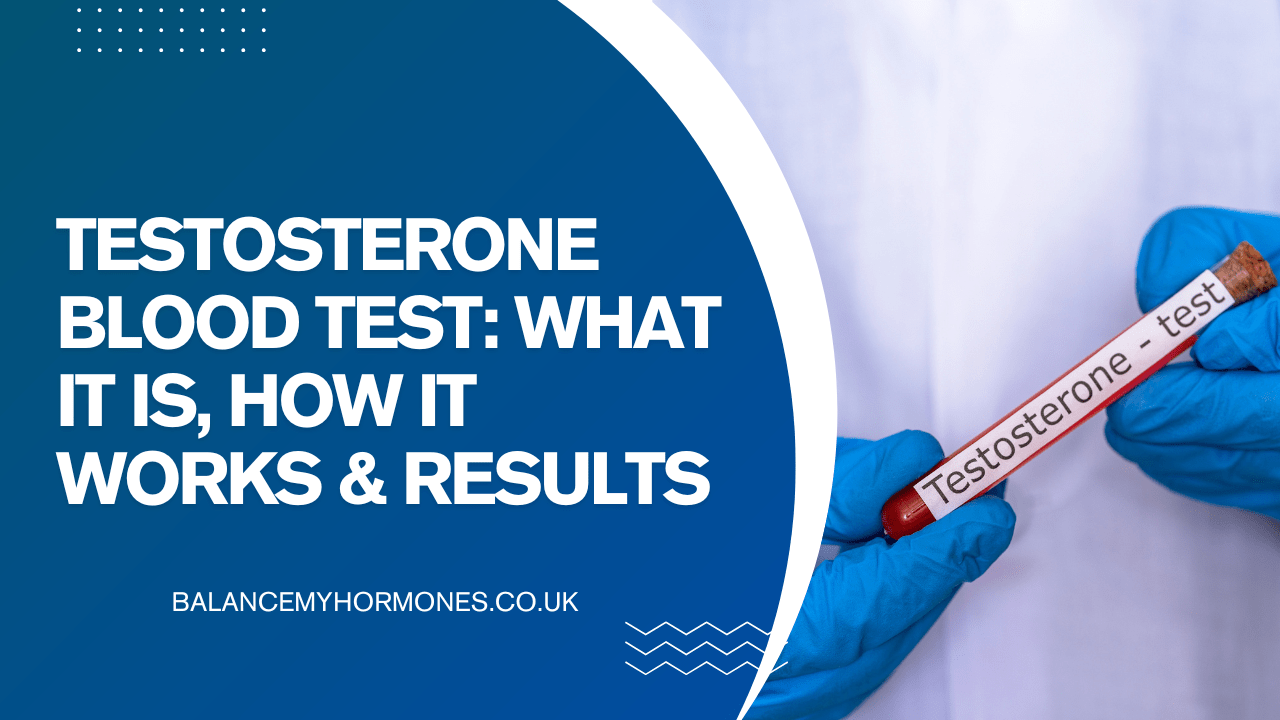
By Mike Kocsis | 10 minutes read | Last updated: June 16, 2025 Categories: Testosterone
Medically Reviewed by Dr. George Touliatos
Low testosterone in teenage and young males means that they are producing below 300 nanograms per deciliter (ng/dL) of testosterone.
Normal testosterone levels are 300 to 1,000 ng/dL. So, when you produce lower than these, many bodily processes get disturbed, impacting your health in various ways.
Although low testosterone is a common problem among older adults, teenagers rarely experience it. In fact, teenage is the phase of life when testosterone levels are the highest. And they only start declining, as a normal part of ageing, when you reach 30.
There are various external (lifestyle-related) and internal causes of low testosterone. Identifying what’s causing the problem is crucial to determining the right approach for treatment.
In this article, we talk about the causes, signs, diagnoses, and treatments of low testosterone in teenage and young males. We explain everything that you need to know about this condition to get rid of its symptoms.
What is the role of testosterone in teenagers?
In males, testosterone is primarily produced in the testes, though small amounts are also secreted by the adrenal glands. Testosterone affects your health in various ways.
During adolescence, testosterone levels rise sharply, leading to various physical, emotional and cognitive changes in the body.
Physically, testosterone develops secondary sexual characteristics in teenagers, such as:
- Increased muscle mass
- Deepening of the voice
- Growth of facial and body hair
- Broadening of shoulders
- Increase in height
- Body composition changes
- Enlargement of the genitals
Beyond secondary sexual development, testosterone is also involved in emotional regulation and cognitive function.
It impacts mood stability, aggression, and risk-taking behaviours – which is common during adolescence due to increasing hormone levels.
Is low testosterone in teenage males common?
Low testosterone in teenagers is not a common occurrence.
In males, the amount of testosterone is typically higher when they are younger. In adult males, their testosterone levels start to naturally decline, starting around age 30 by up to 1.6% a year.
So, as you can imagine, for men to experience low testosterone at such a young age is not something that is expected. In fact, it is cause for concern.
Low testosterone signs: How to know if you have low testosterone?
One of the best ways to identify low testosterone or low T is to watch out for its symptoms.
Here are the most common signs and symptoms of low testosterone in teenagers and young males:
Delayed puberty
A pretty clear sign that something is not right when it comes to the male sex hormone testosterone levels is prolonged or delayed puberty.
In their teenage years, males should be going through puberty, which results in a number of changes in their bodies. This is a sign that everything is going as planned.
If puberty is not occurring or is progressing very slowly, this could be a sign that the male’s testosterone levels are not quite in line with what they should be. This could cause several side effects, such as:
- Late or no enlargement of the testicles and penis.
- Lack of facial or body hair growth.
- Absence of voice deepening.
Teenagers may also experience low sexual function and erectile dysfunction.
Decreased muscle mass or strength
Testosterone is required for a healthy muscle mass and muscle growth.
When you have testosterone deficiency syndrome, you may notice reduced muscle growth despite regular physical activity. You may also notice an overall decrease in physical endurance and strength.
Hair thinning
In a similar way to the loss of muscle mass, teenage males, who experience thinning hair earlier than they should, could be experiencing low testosterone.
As with muscle mass, teenage boys should in fact be gaining hair thickness and other features as they go through puberty and a rise in testosterone. But this does not happen if they are low in testosterone.
Weakened bones
Brittle bones are a common side effect in men who are experiencing lower-than-usual testosterone. This symptom is of particular concern since it could cause fractures and bone injuries.
Weakened bones could easily cause trouble when it comes to athletic performance and strength in other areas, as well.
Increased body fat
Another symptom of low testosterone in teenage males is the accumulation of body fat around the abdominal area and chest.
This imbalance in fat distribution can occur when you do not have enough testosterone, whose one of the roles is to regulate fat metabolism.
Mood changes
Teenagers are generally full of energy and motivation. But low testosterone can make them feel lethargic even after getting enough restful sleep.
They experience persistent feelings of irritability, sadness, anxiety and depression.
What are the causes of low testosterone in young males?
Young men can experience low T due to various causes, including but not limited to:
Lifestyle
Lifestyle plays an important role in the health and testosterone levels of teenagers than many people realise.
If a teenage male is leading an unhealthy lifestyle, they are much more prone to having lower than usual levels of testosterone.
Poor lifestyle habits that can cause low T are:
- A diet lacking in essential nutrients
- Excessive stress
- Lack of physical activity
- Poor sleep hygiene
- Obesity
Disorders
Another factor that could affect the level of testosterone in the body of a teenage male is any disorders that they might be experiencing. The most common of these is primary and secondary hypogonadism.
Primary hypogonadism and secondary hypogonadism occur when the body does not produce testosterone in a normal amount due to problems with the testes or the hypothalamus/pituitary gland.
Other conditions that can contribute to low testosterone levels are:
- Klinefelter syndrome
- Noonan syndrome
- Autoimmune diseases
- Sleep apnea
- Chronic illness
- Chronic stress
- Pituitary disorders
- Primary testicular failure
- Undescended testicles
Treatments
In addition to disorders affecting the amount of testosterone, the treatments for those conditions can also have the same effect.
A great example of this would be cancer treatment chemotherapy. This is a harsh treatment that can impact the functionality of the body.
Certain medications like opioids, corticosteroids, and some antidepressants can also suppress the body’s natural production of testosterone.
How to diagnose low testosterone in teenagers?
The first step to properly treating low testosterone in teenage males is to properly diagnose the condition. Without a good diagnosis, you will be flying blind when it comes to getting to the bottom of the cause and treating it to have a favourable outcome.
One way to diagnose the condition is to watch for the side effects and match those up to what is typical of teenage males.
The problem with this is that it can lead to many false positives since teenage men are typically going through a range of changes in their teenage years.
A much more effective and accurate way to diagnose low testosterone is to get a testosterone blood test that tells you how much testosterone is in the bloodstream.
A blood test can be conducted at a testosterone clinic or by a regular doctor.
What tests are conducted to diagnose low testosterone?
Your doctor can perform a variety of tests to identify the actual cause of the problem. Most commonly used tests are:
Total testosterone blood test
It is the primary test used for this condition. It tells you how much testosterone you have in your bloodstream.
A testosterone blood test is conducted like a regular blood test. A sample of blood is taken in the morning and then it is sent to the lab where it is tested for testosterone levels.
Luteinizing hormone (LH) and follicle-stimulating hormone (FSH) tests
Luteinizing hormone and follicle-stimulating hormone are pituitary hormones that stimulate testosterone production from the testes.
Its low levels indicate a problem with the pituitary, which is a sign of secondary hypogonadism.
Prolactin test
Prolactin is another hormone produced by the pituitary. Its high levels can reduce testosterone production.
Testicular ultrasound
Testicular ultrasound may be done if physical symptoms like small testes or testicular injury are observed. This imaging test helps evaluate the structure of the testes and determine if there is any problem with them.
Genetic testing
Genetic testing is done to determine whether the individual has a genetic condition like Klinefelter syndrome that may be causing abnormal testosterone levels.
What are the treatments for low testosterone in teenage males?
Treatment for low blood testosterone depends on its cause.
For instance, if a teenager has testosterone deficiency due to obesity, their doctor will ask them to lose weight via lifestyle changes.
They may have to work with a nutritionist to create a healthy eating plan that promotes a normal weight while supporting overall hormone balance.
If the cause is a medical condition involving pituitary or genetic disorders, the treatment may involve addressing the underlying problem.
This could include medications to stimulate the pituitary gland or surgery to remove pituitary tumours, depending on the nature of the disorder.
And if you have male hypogonadism, your endocrinologist may prescribe testosterone replacement therapy (TRT) – a form of hormone replacement therapy (HRT).
TRT for males is an approved hormone therapy involving the administration of synthetic testosterone to bring blood testosterone levels within the normal range.
Testosterone treatment has helped countless men boost their testosterone levels and get rid of unpleasant low T signs.
What are the side effects of testosterone replacement therapy?
Even though TRT is a safe method, it has some side effects, due to which it is not easily prescribed to every other person.
Your doctor prescribes TRT only after conducting a thorough evaluation and comparing the TRT pros and cons for your individual case.
Here are the common side effects of TRT:
- Acne
- Skin irritation
- Smaller testicles
- Breast enlargement
- Fluid retention
- Mood changes
- Sleep apnea
- Male infertility due to low sperm production or low sperm count
- Increased red blood cell count
- Prostate health concerns like prostate cancer
What to do if you have low testosterone symptoms as a teenage male?
If you are ready to treat the symptoms and underlying cause of low testosterone in teenage males, then there are a few steps that you need to take.
The first of these is to get an official diagnosis from one of our specialist testosterone doctors.
This will involve contacting us for a free consultation, then booking a testosterone blood test at one of our certified centres or using a testosterone blood kit for use at home via finger prick blood test.
The next step is to listen to the advice of the medical professional as to how to treat the underlying cause of the low testosterone.
This could amount to testosterone replacement therapy or lifestyle changes that will make your body more friendly to testosterone production.
Either way, this will need to be done in conjunction with a medical professional who knows what they are dealing with.
Does low testosterone cause hair loss?
Low testosterone can cause body hair loss in teenage males. Testosterone plays a role in hair follicle growth, and when levels are low, it can lead to thinning or slower hair growth
Does vaping lower testosterone?
Yes, vaping can cause hormone imbalance and also lower your testosterone levels. E-cigarettes have chemicals like nicotine that, according to studies, can negatively influence hormones.
Can you build muscles with low testosterone?
Yes, you can build muscles with low testosterone, but since testosterone is essential for muscle strength and growth, you will need to put in extra effort to see results.
This involves adopting a structured workout routine and focusing on strength training exercises that target major muscle groups.
Does low testosterone cause premature ejaculation?
While there is no direct link, low testosterone may contribute to premature ejaculation (PE). However, it is not typically the primary cause.
Conclusion
Low testosterone can negatively impact a teenage and young male’s life in multiple ways. It can leave them feeling mentally and physically drained and causing them to fall behind in various aspects of their development.
If you are experiencing low testosterone as a teenage male, you must see a testosterone professional to treat low testosterone.
At Balance My Hormones, we assist teenage males in diagnosing low T, treating it with TRT, and getting back to living a healthier life.
Contact our professionals today to discuss your case and find out suitable solutions now.
References
Fang, S.H., Lu, C.C., Lin, H.W., Kuo, K.C., Sun, C.Y., Chen, Y.Y. and Chang, W.D., 2022. Acute effects of nicotine on physiological responses and sport performance in healthy baseball players. International Journal of Environmental Research and Public Health, 19(1), p.515.
Vogiatzi, M., Tursi, J.P., Jaffe, J.S., Hobson, S. and Rogol, A.D., 2021. Testosterone use in adolescent males: current practice and unmet needs. Journal of the Endocrine Society, 5(1), p.bvaa161.
Stancampiano, M.R., Lucas-Herald, A.K., Russo, G., Rogol, A.D. and Ahmed, S.F., 2020. Testosterone therapy in adolescent boys: the need for a structured approach. Hormone research in paediatrics, 92(4), pp.215-228.
Evidence Based Research
This article has been researched and written based on scientific evidence and fact sheets that have then been crossed checked by our team of doctors and subject matter experts.
References, sources and studies used alongside our own in-house research have been cited below, most of which contain external clickable links to reviewed scientific paper that contain date stamped evidence.
Our team of healthcare experts and GMC registered doctors are licensed to UK GMC standards. We strive to provide you with the latest evidence based, researched articles that are unbiased, honest and provide you with accurate insights, statistics and helpful information on the discussed topic to ensure you gain a better understanding of the subject. You can read more about our Editorial Process by clicking here.
We value your feedback on our articles, if you have a well-researched paper you would like to share with us please contact us.
Quick Low Testosterone Test
If you know your total testosterone reading from a previous blood test input the results to the left above to see if your testosterone levels are normal.
Low Testosterone Levels
You may have low testosterone depending on the symptoms you have, please contact us to find out how we can help.
Please Retry
The Total Testosterone Level You Entered Is Incorrect. Figure Must be in nmol/L you can use our converter here.
Normal Testosterone Levels
Your testosterone levels appear to be in the normal range.
LOOKING GOOD!
You must be over 38, have had your ovaries removed or have suffered with premature menopause to warrant further hormone tests.
Further investigation needed
Please contact us to discuss your hormones, we need your total testosterone levels to validate your hormone deficiency. You can order a blood test here.
Low Testosterone Levels
You may have low testosterone depending on the symptoms you have, please contact us to find out how we can help.
High Testosterone Levels
You appear to have higher than normal testosterone levels, please contact us for further investigation.
Normal Testosterone Levels
You appear to have normal testosterone levels. Contact us if you have any concerns.


 Mike Kocsis has an MBA with a focus on healthcare administration and is an entrepreneur and medical case manager for Balance My Hormones which offers medical services in the UK and Europe. Mike has over 25 years of experience in the healthcare sector, much of that working with people who have hormone imbalances. Mike has appeared on
Mike Kocsis has an MBA with a focus on healthcare administration and is an entrepreneur and medical case manager for Balance My Hormones which offers medical services in the UK and Europe. Mike has over 25 years of experience in the healthcare sector, much of that working with people who have hormone imbalances. Mike has appeared on 

